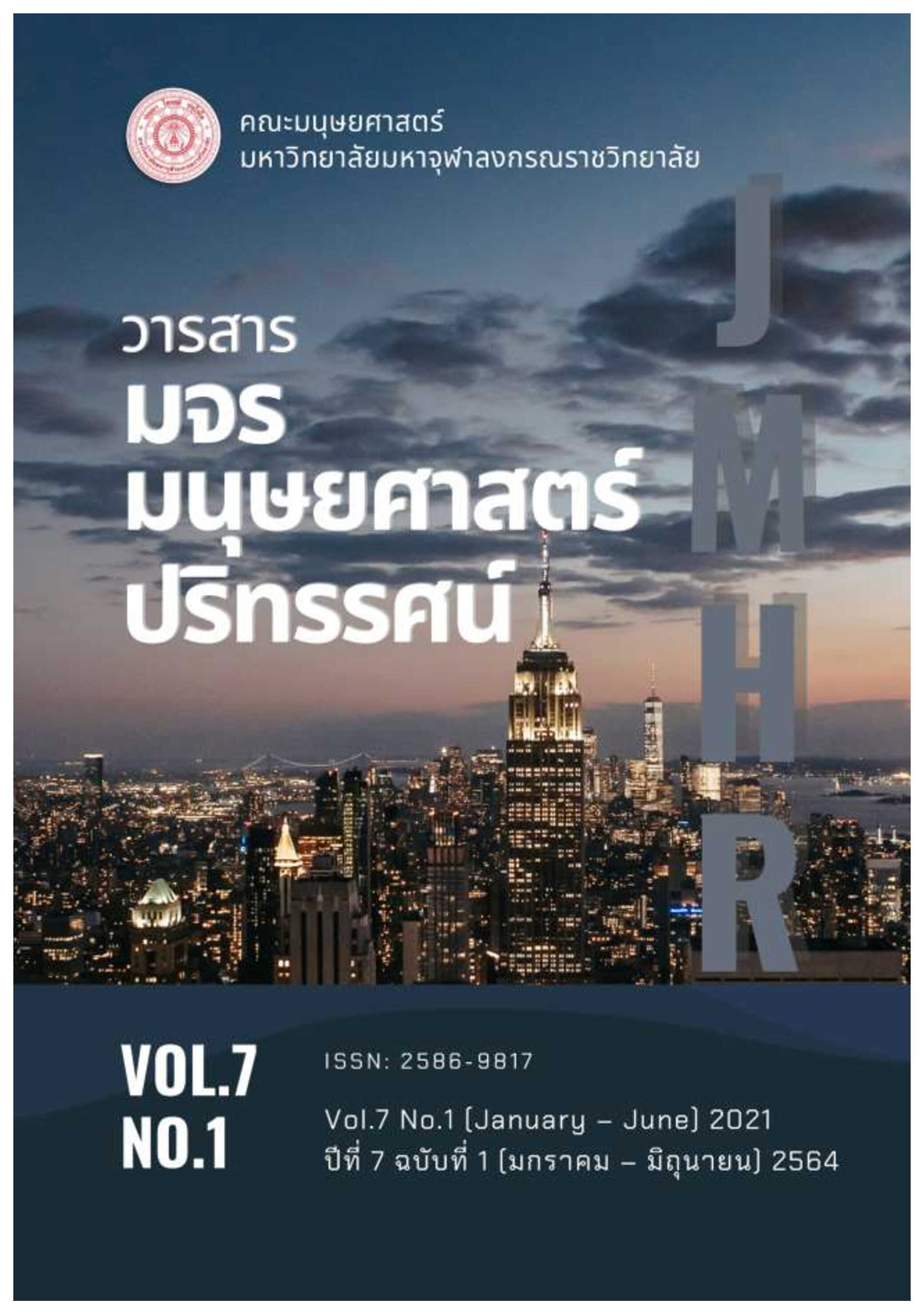โปรแกรมการเสริมสร้างคุณลักษณะจิตสาธารณะ และการเห็นคุณค่า ในตนตามแนวพุทธจิตวิทยาของผู้บวชเนกขัมมะบารมี
คำสำคัญ:
จิตสาธารณะ, การเห็นคุณค่าในตน, พุทธจิตวิทยาบทคัดย่อ
บทคัดย่อ
การวิจัยครั้งนี้มีวัตถุประสงค์ คือ 1)เพื่อพัฒนาโปรแกรมการเสริมสร้างคุณลักษณะจิตสาธารณะ และการเห็นคุณค่าในตนตามแนวพุทธจิตวิทยาของผู้บวชเนกขัมมะบารมี 2) เพื่อศึกษาผลการใช้โปรแกรมการเสริมสร้างคุณลักษณะจิตสาธารณะ และการเห็นคุณค่าในตนตามแนวพุทธจิตวิทยาของผู้บวชเนกขัมมะบารมี 3) เพื่อนำเสนอโปรแกรมการเสริมสร้างคุณลักษณะจิตสาธารณะ และการเห็นคุณค่าในตนของผู้บวชเนกขัมมะบารมี โปรแกรมการวิจัยในครั้งนี้เป็นแบบกึ่งทดลอง (Quasi-Experimental Design) เก็บรวบรวมข้อมูลเชิงคุณภาพโดยการศึกษาเอกสาร และการสัมภาษณ์แบบมีโครงสร้างกับผู้ทรงคุณวุฒิจำนวน 17 รูป/ท่าน ได้จากการเลือกแบบเจาะจง และนำผลจากวิธีการวิจัยเชิงคุณภาพมาพัฒนาโปรแกรมการเสริมสร้างคุณลักษณะจิตสาธารณะ และการเห็นคุณค่าในตนตามแนวพุทธจิตวิทยาของผู้บวชเนกขัมมะบารมี ประเมินโปรแกรมโดยการสนทนากลุ่ม (Focus Group) กับผู้ทรงคุณวุฒิจำนวน 6 รูป/ท่าน และนำโปรแกรมฯ ที่ได้ไปทำการวิจัยกึ่งทดลองกับกลุ่มตัวอย่างจำนวน 60 คน แบ่งเป็นกลุ่มทดลองและกลุ่มควบคุมกลุ่มละ 30 คนด้วยกระบวนการสุ่มแบบง่าย กลุ่มทดลองได้เข้าร่วมโปรแกรมการเสริมสร้างคุณลักษณะจิตสาธารณะ และการเห็นคุณค่าในตน ตามแนวพุทธจิตวิทยาของผู้บวชเนกขัมมะบารมี และใช้แบบสอบถามวัดผลเชิงปริมาณในระยะหลังการทดลอง และระยะการติดตามผล 3 สัปดาห์
ผลการวิจัยพบว่า
- การเสริมสร้างคุณลักษณะจิตสาธารณะ และการเห็นคุณค่าในตนตามแนวพุทธจิตวิทยาของผู้บวชเนกขัมมะบารมี เกิดขึ้นจากองค์ประกอบใน 4 ด้าน คือ 1) ด้านคุณลักษณะของเนกขัมมะบารมี (1) การปฏิบัติธรรม 2 คืน 3 วัน (2) การรักษาศีล 8 (3) การฝึกอานาปานสติ (4) สนทนาธรรมปฏิจจสมุปบาท (5) ศาสนพิธีกรรม 2) ด้านคุณลักษณะของจิตสาธารณะ (1) เมตตากรุณา (2) มีกายใจที่สมดุล (3) มีความรับผิดชอบต่อตนเองและผู้อื่น (4) การดำเนินชีวิตอย่างเป็นสุข 3) ด้านคุณลักษณะของการเห็นคุณค่าในตน คือ (1) รู้สึกว่าตนเองมีคุณค่ามีความหมาย (2) เป็นที่ยอบรับของผู้อื่น (3) ประสบความสำเร็จตามเป้าหมาย (4) มีความภาคภูมิใจในตนเอง 4) ด้านหลักธรรมของผู้บวช (1) ไตรสิกขา (2) สติ (3) พรหมวิหารธรรม (4) อานาปานสติ
- โปรแกรมการเสริมสร้างคุณลักษณะจิตสาธารณะ และการเห็นคุณค่าในตนตามแนวพุทธจิตวิทยาของผู้บวชเนกขัมมะบารมี คือโปรแกรมการอบรมประกอบด้วยกิจกรรมทั้งหมด 14 กิจกรรม คือ 1) สัมพันธภาพใหม่ด้วยหัวใจกรุณา 2) ปรับคลื่นสัญญาณใจ 3) สมาทานข้อฝึกสติ 8 ประการ 4) ธรรมะรับอรุณ 1-2 5) โยคะภาวนา 6) พิจารณาอาหารถวายทานแก่สังฆะ 7) อานาปานสติภาวนาลมหายใจแห่งสติ 8) เนกขัมมะวิริยบารมี 9) ปฏิจจสมุปบาทประตูสู่ภาวะใหม่ 10) คุณค่าแห่งชีวิต 11) ก้าวย่างตามรอยธรรม 12) เมล็ดพันธุ์แห่งความดี 13) อาหารใจ 14) วุฒิบัตรแห่งการตื่นรู้
- การประเมินผลการทดลองใช้โปรแกรมการเสริมสร้างคุณลักษณะจิตสาธารณะ และการเห็นคุณค่าในตนตามแนวพุทธจิตวิทยาของผู้บวชเนกขัมมะบารมี พบว่า 1) คะแนนเฉลี่ยทางด้านคุณลักษณะจิตสาธารณะของผู้บวชเนกขัมมะบารมีหลังการทดลองสูงกว่าก่อนทดลอง อย่างมีนัยสำคัญทางสถิติที่ระดับ .01 2) คะแนนเฉลี่ยทางด้านคุณลักษณะการเห็นคุณค่าในตนของผู้บวชเนกขัมมะบารมีหลังการทดลองสูงกว่าก่อนทดลอง อย่างมีนัยสำคัญทางสถิติที่ระดับ .01 3) คะแนนเฉลี่ยทางด้านคุณลักษณะจิตสาธารณะและทางด้านคุณลักษณะการเห็นคุณค่าในตนของผู้บวชเนกขัมมะบารมีในกลุ่มทดลอง หลังการทดลองและระยะติดตามผลไม่แตกต่างกัน แสดงว่า มีความคงทนของระดับคุณลักษณะจิตสาธารณะ และคุณลักษณะการเห็นคุณค่าในตนของผู้บวชเนกขัมมะบารมีที่เป็นผลจากการใช้โปรแกรมการเสริมสร้างคุณลักษณะจิตสาธารณะ และการเห็นคุณค่าในตนตามแนวพุทธจิตวิทยาของผู้บวชเนกขัมมะบารมีที่พัฒนาขึ้นตามกระบวนการ 14 กิจกรรม
เอกสารอ้างอิง
พระพรหมคุณาภรณ์ (ป.อ. ปยุตฺโต). (2549). พุทธธรรมฉบับปรับปรุงขยายความ (พิมพ์ครั้งที่ 11). กรุงเทพฯ : สหธรรมิก.
“_________”. (2555). พุทธธรรม ฉบับปรับขยาย (พิมพ์ครั้งที่ 35). กรุงเทพฯ : ผลิธัมม์.
พระมหาไสว ญาณวีโร. (2549). คู่มือวิปัสสนาจารย์. กรุงเทพฯ : เลี่ยงเชียง.
พระมหาสุเทพ สุทฺธิญาโณ. (2562). พุทธวิถีคิลานธรรม คุณค่าแห่งการดำารงชีวิตและการเยียวยาจิตใจตามหลักพุทธ-จิตวิทยา. กรุงเทพฯ : นิติธรรม.
พีสสลัล ธำรงศ์วรกุล. (2553). การพัฒนาโปรแกรมการให้การปรึกษาครบครัวเชิงบูรณาการเพื่อสร้างเสริมสุขภาพจิตผู้สูงอายุ (วิทยานิพนธ์ศึกษาศาสตรดุษฎีบัณฑิต). มหาวิทยาลัยรามคำแหง : กรุงเทพมหานคร.
มหาจุฬาลงกรณราชวิทยาลัย. (2539). พระไตรปิฎกภาษาไทย ฉบับมหาจุฬาลงกรณราชวิทยาลัย. กรุงเทพฯ : มหาวิทยาลัยมหาจุฬาลงกรณราชวิทยาลัย.
รจนา วิริยะสมบัติ. (2553). ประสิทธิผลของโปรแกรมการปฏิบัติตามหลักพุทธธรรมในการส่งเสริมความผาสุกทางจิตวิญญาณ การเผชิญปัญหาและคุณภาพการนอนหลับของผู้สูงอายุไทย (วิทยานิพนธ์พยาบาลศาสตรดุษฎีบัณฑิต). มหาวิทยาลัย เชียงใหม่ : เชียงใหม่.






